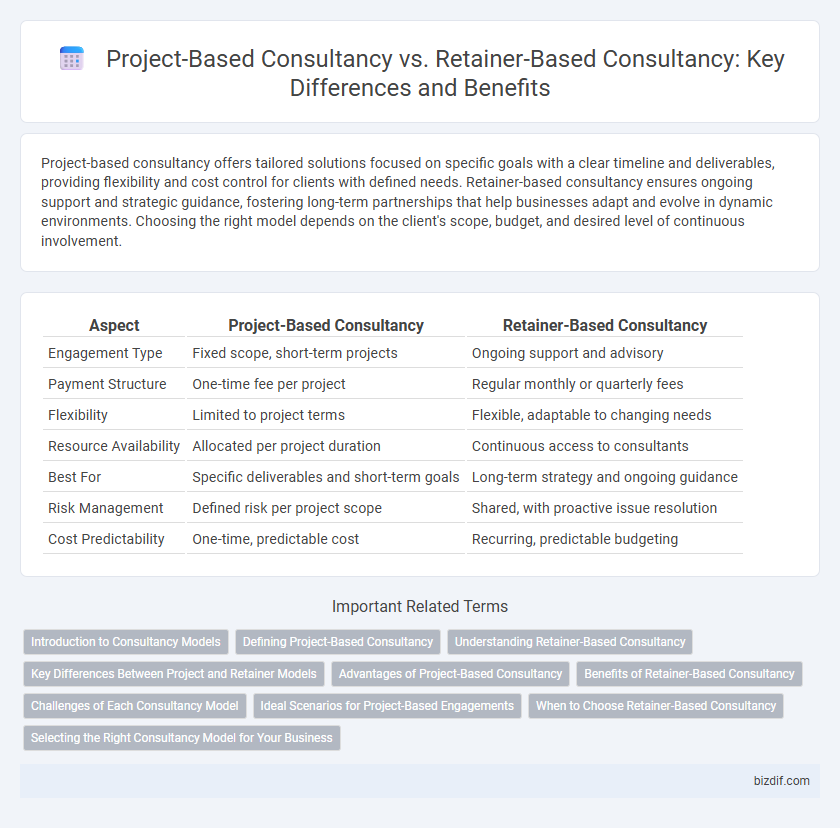Project-based consultancy offers tailored solutions focused on specific goals with a clear timeline and deliverables, providing flexibility and cost control for clients with defined needs. Retainer-based consultancy ensures ongoing support and strategic guidance, fostering long-term partnerships that help businesses adapt and evolve in dynamic environments. Choosing the right model depends on the client's scope, budget, and desired level of continuous involvement.
Table of Comparison
| Aspect | Project-Based Consultancy | Retainer-Based Consultancy |
|---|---|---|
| Engagement Type | Fixed scope, short-term projects | Ongoing support and advisory |
| Payment Structure | One-time fee per project | Regular monthly or quarterly fees |
| Flexibility | Limited to project terms | Flexible, adaptable to changing needs |
| Resource Availability | Allocated per project duration | Continuous access to consultants |
| Best For | Specific deliverables and short-term goals | Long-term strategy and ongoing guidance |
| Risk Management | Defined risk per project scope | Shared, with proactive issue resolution |
| Cost Predictability | One-time, predictable cost | Recurring, predictable budgeting |
Introduction to Consultancy Models
Project-based consultancy involves delivering specific, time-bound solutions tailored to well-defined client objectives, emphasizing clear milestones and deliverables. Retainer-based consultancy offers continuous, on-demand expertise that fosters long-term partnerships and ongoing strategic support. Choosing between models depends on factors such as project scope, budget flexibility, and desired engagement intensity.
Defining Project-Based Consultancy
Project-based consultancy involves engaging experts for specific, time-bound assignments with clear objectives and deliverables, allowing clients to address distinct business challenges or implement targeted solutions. This model emphasizes outcome-driven collaboration, where consultants provide specialized knowledge and skills tailored to the project's scope without long-term commitment. Clients benefit from cost predictability and focused expertise, optimizing resource allocation for individual initiatives.
Understanding Retainer-Based Consultancy
Retainer-based consultancy involves an ongoing partnership where clients pay a fixed monthly fee for continuous access to expert advice and support, ensuring consistent strategic alignment and quick problem resolution. This model fosters long-term collaboration, enabling consultants to deeply understand business challenges and proactively offer tailored solutions. Businesses benefit from predictable budgeting and priority service, enhancing operational efficiency and decision-making processes.
Key Differences Between Project and Retainer Models
Project-based consultancy delivers services for specific, time-bound objectives with clearly defined scopes, budgets, and deadlines, ideal for one-off or discrete projects. Retainer-based consultancy offers ongoing access to expert advice and support, typically billed as a recurring fee, fostering long-term partnerships and flexible resource allocation. Key differences include payment structure, client-consultant relationship duration, and adaptability to evolving business needs.
Advantages of Project-Based Consultancy
Project-based consultancy offers clear deliverables and defined timelines, ensuring clients receive specific outcomes within a set budget that enhances cost control. This model allows for flexibility, enabling businesses to engage consultants for specialized expertise only when needed without ongoing financial commitments. It facilitates targeted problem-solving, making it ideal for companies with distinct project goals or one-time challenges requiring expert guidance.
Benefits of Retainer-Based Consultancy
Retainer-based consultancy offers continuous access to expert advice, ensuring proactive problem-solving and long-term strategic alignment. Clients benefit from predictable costs and prioritized service, which fosters stronger consultant-client relationships and deeper organizational understanding. This model supports agile decision-making and sustained business growth by embedding consultancy into daily operations.
Challenges of Each Consultancy Model
Project-based consultancy often faces challenges such as scope creep, tight deadlines, and limited client engagement post-delivery, which can hinder long-term relationship building. Retainer-based consultancy struggles with fluctuating workloads, maintaining ongoing value for clients, and justifying continuous fees amidst variable project demands. Both models require effective communication and clear expectations to mitigate risks related to resource allocation and client satisfaction.
Ideal Scenarios for Project-Based Engagements
Project-based consultancy is ideal for clients seeking specific deliverables within a defined timeframe, such as launching a new product or conducting a market analysis. This approach suits businesses with clear objectives and a fixed budget, enabling precise scope management and measurable outcomes. Organizations undergoing digital transformation or deploying technology solutions often benefit from project-based engagements due to their structured milestones and targeted expertise.
When to Choose Retainer-Based Consultancy
Retainer-based consultancy is ideal when businesses require ongoing expert support, continuous strategic guidance, and consistent problem-solving over time. This model suits organizations facing complex, evolving challenges that benefit from long-term collaboration and proactive advisory services. Companies expecting regular, recurring consultancy needs should choose retainers to ensure priority access and cost efficiency.
Selecting the Right Consultancy Model for Your Business
Choosing the right consultancy model depends on your business goals and budget: project-based consultancy offers flexibility and clear deliverables for specific tasks, making it ideal for short-term initiatives or one-off projects. Retainer-based consultancy provides ongoing support and strategic advice, fostering long-term collaboration and continuous improvement for businesses seeking sustained growth. Evaluating project scope, desired level of involvement, and cost structure ensures alignment with your company's operational needs and maximizes consultancy impact.
Project-Based Consultancy vs Retainer-Based Consultancy Infographic

 bizdif.com
bizdif.com